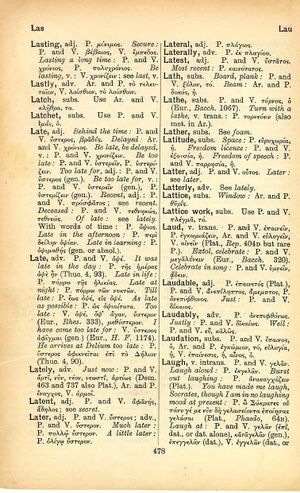later: Difference between revisions
(CSV4) |
(6_9) |
||
| Line 4: | Line 4: | ||
<b class="b2">Much later</b>: P. πολλῷ [[ὕστερον]]. | <b class="b2">Much later</b>: P. πολλῷ [[ὕστερον]]. | ||
<b class="b2">A little later</b>: P. ὀλίγῳ [[ὕστερον]]. | <b class="b2">A little later</b>: P. ὀλίγῳ [[ὕστερον]]. | ||
}} | |||
{{Lewis | |||
|lshtext=<b>lăter</b>: ĕris, m. Sanscr. [[root]] prath-, [[widen]]; prathas, [[breadth]]; Gr. [[πλατύς]], [[πλάτος]]>,<br /><b>I</b> a [[brick]], [[tile]].<br /><b>I</b> Lit.: nil mirum, [[vetus]] est [[maceria]], lateres si veteres ruunt, Plaut. Truc. 2, 2, 49 sqq.: in latere aut in caemento, ex quibus [[urbs]] effecta est, Cic. Div. 2, 47, 98; cf.: [[paries]] crudo latere ac [[luto]] [[constructus]], Col. 9, 1, 2: contabulationem summam lateribus lutoque constraverunt, Caes. B. C. 2, 9: lateres de [[terra]] ducere, to [[make]], Vitr. 2, 3, 1: lateres coquere, to [[burn]], id. 1, 5: sepimentum e lateribus coctilibus, [[burnt]] bricks, Varr. R. R. 1, 14, 4.—Prov.: laterem lavare, to [[wash]] a [[brick]], = πλίνθον πλύνειν, i. e. to [[wash]] the [[color]] [[out]] of a [[brick]], to [[labor]] in [[vain]], Ter. Phorm. 1, 4, 8; [[but]] cf. Lucil. Sat. 9, 19.—<br /><b>II</b> Transf.: lateres aurei, argentei, bars, ingots, or wedges of [[gold]], of [[silver]], Plin. 33, 3, 17, § 56; Varr. ap. Non. 131, 15; 520, 17. | |||
}} | }} | ||
Revision as of 08:35, 13 August 2017
English > Greek (Woodhouse)
adj.
P. and V. ὕστερος; adv., P. and V. ὕστερον. Much later: P. πολλῷ ὕστερον. A little later: P. ὀλίγῳ ὕστερον.
Latin > English (Lewis & Short)
lăter: ĕris, m. Sanscr. root prath-, widen; prathas, breadth; Gr. πλατύς, πλάτος>,
I a brick, tile.
I Lit.: nil mirum, vetus est maceria, lateres si veteres ruunt, Plaut. Truc. 2, 2, 49 sqq.: in latere aut in caemento, ex quibus urbs effecta est, Cic. Div. 2, 47, 98; cf.: paries crudo latere ac luto constructus, Col. 9, 1, 2: contabulationem summam lateribus lutoque constraverunt, Caes. B. C. 2, 9: lateres de terra ducere, to make, Vitr. 2, 3, 1: lateres coquere, to burn, id. 1, 5: sepimentum e lateribus coctilibus, burnt bricks, Varr. R. R. 1, 14, 4.—Prov.: laterem lavare, to wash a brick, = πλίνθον πλύνειν, i. e. to wash the color out of a brick, to labor in vain, Ter. Phorm. 1, 4, 8; but cf. Lucil. Sat. 9, 19.—
II Transf.: lateres aurei, argentei, bars, ingots, or wedges of gold, of silver, Plin. 33, 3, 17, § 56; Varr. ap. Non. 131, 15; 520, 17.

